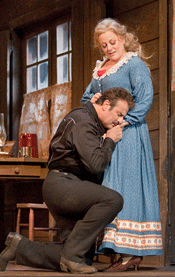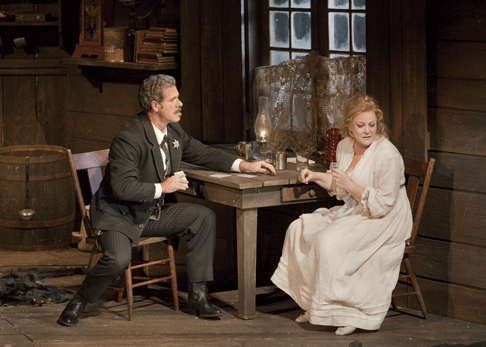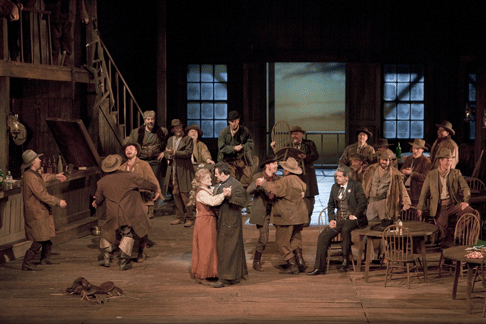![Deborah Voigt as Minnie [Photo by Ken Howard courtesy of Metropolitan Opera]](http://www.operatoday.com/Fanciulla_Met_2010_02.gif)
19 Dec 2010
La Fanciulla del West, New York
La Fanciulla del West is Puccini’s love letter to an America that had acclaimed him joyously on his triumphant visit of 1907 to attend the Met premieres of Manon Lescaut and Madama Butterfly.
English Touring Opera are delighted to announce a season of lyric monodramas to tour nationally from October to December. The season features music for solo singer and piano by Argento, Britten, Tippett and Shostakovich with a bold and inventive approach to making opera during social distancing.
This tenth of ten Live from London concerts was in fact a recorded live performance from California. It was no less enjoyable for that, and it was also uplifting to learn that this wasn’t in fact the ‘last’ LfL event that we will be able to enjoy, courtesy of VOCES8 and their fellow vocal ensembles (more below …).
Ever since Wigmore Hall announced their superb series of autumn concerts, all streamed live and available free of charge, I’d been looking forward to this song recital by Ian Bostridge and Imogen Cooper.
Although Stile Antico’s programme article for their Live from London recital introduced their selection from the many treasures of the English Renaissance in the context of the theological debates and upheavals of the Tudor and Elizabethan years, their performance was more evocative of private chamber music than of public liturgy.
Evidently, face masks don’t stifle appreciative “Bravo!”s. And, reducing audience numbers doesn’t lower the volume of such acclamations. For, the audience at Wigmore Hall gave soprano Elizabeth Llewellyn and pianist Simon Lepper a greatly deserved warm reception and hearty response following this lunchtime recital of late-Romantic song.
For this week’s Live from London vocal recital we moved from the home of VOCES8, St Anne and St Agnes in the City of London, to Kings Place, where The Sixteen - who have been associate artists at the venue for some time - presented a programme of music and words bound together by the theme of ‘reflection’.
'Such is your divine Disposation that both you excellently understand, and royally entertaine the Exercise of Musicke.’
‘And there was war in heaven: Michael and his angels fought against the dragon; and the dragon fought and his angels, And prevailed not; neither was their place found any more in heaven … that old serpent … Satan, which deceiveth the whole world: he was cast out into the earth, and his angels were cast out with him.’
There was never any doubt that the fifth of the twelve Met Stars Live in Concert broadcasts was going to be a palpably intense and vivid event, as well as a musically stunning and theatrically enervating experience.
‘Love’ was the theme for this Live from London performance by Apollo5. Given the complexity and diversity of that human emotion, and Apollo5’s reputation for versatility and diverse repertoire, ranging from Renaissance choral music to jazz, from contemporary classical works to popular song, it was no surprise that their programme spanned 500 years and several musical styles.
The Academy of St Martin in the Fields have titled their autumn series of eight concerts - which are taking place at 5pm and 7.30pm on two Saturdays each month at their home venue in Trafalgar Square, and being filmed for streaming the following Thursday - ‘re:connect’.
The London Symphony Orchestra opened their Autumn 2020 season with a homage to Oliver Knussen, who died at the age of 66 in July 2018. The programme traced a national musical lineage through the twentieth century, from Britten to Knussen, on to Mark-Anthony Turnage, and entwining the LSO and Rattle too.
With the Live from London digital vocal festival entering the second half of the series, the festival’s host, VOCES8, returned to their home at St Annes and St Agnes in the City of London to present a sequence of ‘Choral Dances’ - vocal music inspired by dance, embracing diverse genres from the Renaissance madrigal to swing jazz.
Just a few unison string wriggles from the opening of Mozart’s overture to Le nozze di Figaro are enough to make any opera-lover perch on the edge of their seat, in excited anticipation of the drama in music to come, so there could be no other curtain-raiser for this Gala Concert at the Royal Opera House, the latest instalment from ‘their House’ to ‘our houses’.
"Before the ending of the day, creator of all things, we pray that, with your accustomed mercy, you may watch over us."
The doors at The Metropolitan Opera will not open to live audiences until 2021 at the earliest, and the likelihood of normal operatic life resuming in cities around the world looks but a distant dream at present. But, while we may not be invited from our homes into the opera house for some time yet, with its free daily screenings of past productions and its pay-per-view Met Stars Live in Concert series, the Met continues to bring opera into our homes.
Music-making at this year’s Grange Festival Opera may have fallen silent in June and July, but the country house and extensive grounds of The Grange provided an ideal setting for a weekend of twelve specially conceived ‘promenade’ performances encompassing music and dance.
There’s a “slide of harmony” and “all the bones leave your body at that moment and you collapse to the floor, it’s so extraordinary.”
“Music for a while, shall all your cares beguile.”
The hum of bees rising from myriad scented blooms; gentle strains of birdsong; the cheerful chatter of picnickers beside a still lake; decorous thwacks of leather on willow; song and music floating through the warm evening air.
![Deborah Voigt as Minnie [Photo by Ken Howard courtesy of Metropolitan Opera]](http://www.operatoday.com/Fanciulla_Met_2010_02.gif)
La Fanciulla del West is Puccini’s love letter to an America that had acclaimed him joyously on his triumphant visit of 1907 to attend the Met premieres of Manon Lescaut and Madama Butterfly.
His gratitude and admiration were as sincere as America’s applause, and he lavished on this very American story, based on a hit play about the Gold Rush, everything he had learned about the orchestral canvas. Despite an all-star cast (Destinn, Caruso, Amato, Toscanini in the pit), the opera had a less than dazzling premiere in 1910 and has never quite matched the most popular of his operas.
It is a thousand pities that Puccini, who died in 1924, never saw or read Eugene O’Neill’s Desire Under the Elms, published the same year. He would have been just the man to translate that poetic drama of love for property versus love for, well, a lover, with its classical overtones of adultery, infanticide and murderous family conflict in backwoods America into theatrical melody. Almost unstageable today, the play cries out for Italianization and Puccini’s gift for making lurid action and character memorably tuneful. But the great ships Puccini and O’Neill passed in the night.
 Marcello Giordani as Dick Johnson and Deborah Voigt as Minnie
Marcello Giordani as Dick Johnson and Deborah Voigt as Minnie
It was Puccini’s custom to attend plays in languages he didn’t
understand; if they knocked him out anyway, he knew they’d make good
operas, and he had thus discovered David Belasco’s Madame
Butterfly. His choice now fell on Belasco’s The Girl of the
Golden West, then playing to packed houses on Broadway. If the clichés of
its plot still make us smile (pistol-packing, Bible-teaching virgin cheats at
poker to save her man and rides in on horseback just in time to
prevent his lynching), it is because Belasco, who had actually been raised in
Gold Rush California, set the tone for ten thousand Western movies and TV
episodes to follow. The score is melodramatic (a good thing), romantic and set
to thrill if you get the right singers, if the right singers exist anymore.
Since Fanciulla and Puccini’s later Il Trittico remain
the only works premiered at the Met to have gained any enduring popularity, the
opera’s centennial had to be marked by revival there no matter the lack
of a proper spinto diva.
Fanciulla, despite its swift-moving, surefire story and lush orchestration, does not quite win us over, though the proper cast can make Act II as thrilling as anything in the verismo idiom. Minnie, with so much to sing but no big memorable tune and cursed with a happy ending, has seldom been a favorite with sopranos or the public. Puccini does some wonderful scene-painting (the Sierras at sunset sort of thing, splendidly backdropped by Michael Scott at the Met), and the lovely waltz the miners clap for Minnie’s first dance with Dick Johnson was good enough for Andrew Lloyd Webber to steal it, but she has no irresistible statement of personality to rival “Mi chiamano Mimi” or “Un bel dî” or “Il sogno di Doretta”; nothing to lure us to love the character and be curious about her destiny. Minnie is perhaps too simple to need to explain herself but the unforgettable tune is a necessity, and it’s not here. That lack keeps Fanciulla on the shelf of also-ran Puccini. Emmy Destinn, for whom the part was composed, never recorded any of it, there being no proper aria to fit the three-minute 78rpm format of the day.
 Lucio Gallo as Jack Rance and Deborah Voigt as Minnie
Lucio Gallo as Jack Rance and Deborah Voigt as Minnie
When did the Met last have a credible Minnie? Kirsten and Steber were before my time. Friends mention Dimitrova or Daniels to me; I heard Maralin Niska do it pretty well at the City Opera, though her horse refused to stand still. Aprile Millo did a fine job for Queler some years back but her instrument has been on again-off again for years. Who does that leave us? Could Radvanovsky do it? Would she want to? Accustomed to Verdi, she has commented that Puccini’s orchestra may be too large for her, but she will take on Tosca this winter. That should be interesting.
The Met has given the part to Deborah Voigt, who stakes a claim based on her coloring, her acting, her Americanness and her ability to dismount from a horse, albeit stiffly, in full view of the audience. Her voice, though, is fool’s gold, tatterdemalion, trumpery—it doesn’t pan out. At Minnie’s entrance, breaking up a bar fight, gun a-blazing, fresh and girlish and frontier healthy, Voigt sounds seventy-five years old, the voice wavery and thin. So, too, in the schoolmarm scene and throughout the love music. When she gets anywhere near the proper spinto quality, her breath cannot sustain it. She finally warms up by the climactic poker game that ends Act II, which is far too late. All this should be no surprise to anyone—it’s just the way she sang Senta last year, Isolde the year before that. And you would have to ask stage director Giancarlo del Monaco why instead of green California forest, he has given Minnie a dusty and anachronistic Southwest ghost town for the last act, depriving her of a place to ride a horse on stage, Belasco’s surefire climax. (Mr. del Monaco, who has always had a wall eye for era and locale, had perhaps seen too many Sergio Leone Westerns.)
 A scene from Act I of with Marcello Giordani as Dick Johnson and Deborah Voigt as Minnie (dancing) and Lucio Gallo (seated) as Jack Rance
A scene from Act I of with Marcello Giordani as Dick Johnson and Deborah Voigt as Minnie (dancing) and Lucio Gallo (seated) as Jack Rance
Marcello Giordani, looking very Latin badman in a black duster and mustachios, carries off such vocal honors as the evening offers, with soaring, unstrained sound for Dick’s romantic yearnings, only missing a note or two at the bottom of his range. Lucio Gallo surprised me with an effectively sung and acted Sheriff Rance in a white duster, to confuse those of us accustomed to black-and-white cowboy symbolism. Among the many character roles that endear the opera to comprimarios everywhere, none of them overmugged, I especially enjoyed Tony Stevenson’s jolly bartender, Dwayne Croft’s sturdy Sonora and Oren Gradus as a wandering minstrel. Del Monaco’s direction, aside from putting the horses in the wrong scene, was stagy but not too gimmicky. It did not offend. But if you’re going to make your saloon the size of Grand Central Station, do you have to put the Sheriff and Minnie on opposite sides of it when he is trying to whisper sweet propositions in her ear? (And why put the saloon piano upstairs and out of the way, where it can hardly be useful at parties?)
Nicola Luisotti conducted. He has a flair for Puccini’s big climaxes but he lets them get far too loud. There were several scenes, especially the crowded ones, in which one had to strain to hear the voices. One would appreciate Maestro Luisotti toning it down a bit.
John Yohalem
Right click here to download a video clip from the Poker Scene.
Right click here to download a video clip of the Act II duet with Johnson and Minnie.
Same opera, same production, same cast—but the difference was like night and day. On January 3rd, an indisposed Voigt was replaced by Portuguese soprano Elisabete Matos, who had made her Met debut on December 22nd, a scheduled performance in the same role.
Matos is a genuine spinto—except when she sounds like a real lyric—except when she sounds hochdramatisch. In Europe, she sings in all these categories, but to hell with fach. She has a golden, gleaming sound, warm and fragrant when she lets her guard down romantically (and Minnie in Fanciulla del West is a girl who loves love stories), lyric and casual when jesting with her family of miners, and though brilliant and full (and smack on pitch for the B of “stelle” and the C’s in Act II), her voice is never harsh in anguish or triumph. With a Minnie of this quality, Puccini’s opera finally and worthily celebrated its hundredth birthday at the Met. (Can we have her back again soon? Please? As Butterfly, say, or Sieglinde?)
Matos, though younger, looks very like Debbie Voigt: She cuts a sturdy figure, more athletic frontierswoman than fashion model. A natural actress, she seemed to know each miner inside and out, able to play with them, tease them, slap them about, tousle their hair. This makes all the sillier Giancarlo Del Monaco’s staging of the opera’s climax, when Minnie begs the miners to spare her lover’s life: She has no need to fire guns at them. She knows and we know they’ll never shoot at her. They adore her. She’s never asked them for anything before—and now she does, and of course they let her and her lover depart together romantically into the sunset. (Del Monaco, thinking as usual that he’s cleverer than Puccini, sends all the miners off with them, instead of having them tug our heartstrings as they wave her a last farewell. Puccini always knew what he was doing; directors mess with him at their peril.)
With a different prima donna, a genuine Fanciulla at the heart of the opera, every singer on the stage seemed to turn up an energetic notch or two—glorious high notes from Giordani, fine contributions from Owen Gradus’s Jake, Keith Miller’s Ashby, Dwayne Croft’s Sonora and, well, drinks around the bar, boys! I mean, ragazzi! Great work by all hands. A starry night.
-J.Y.